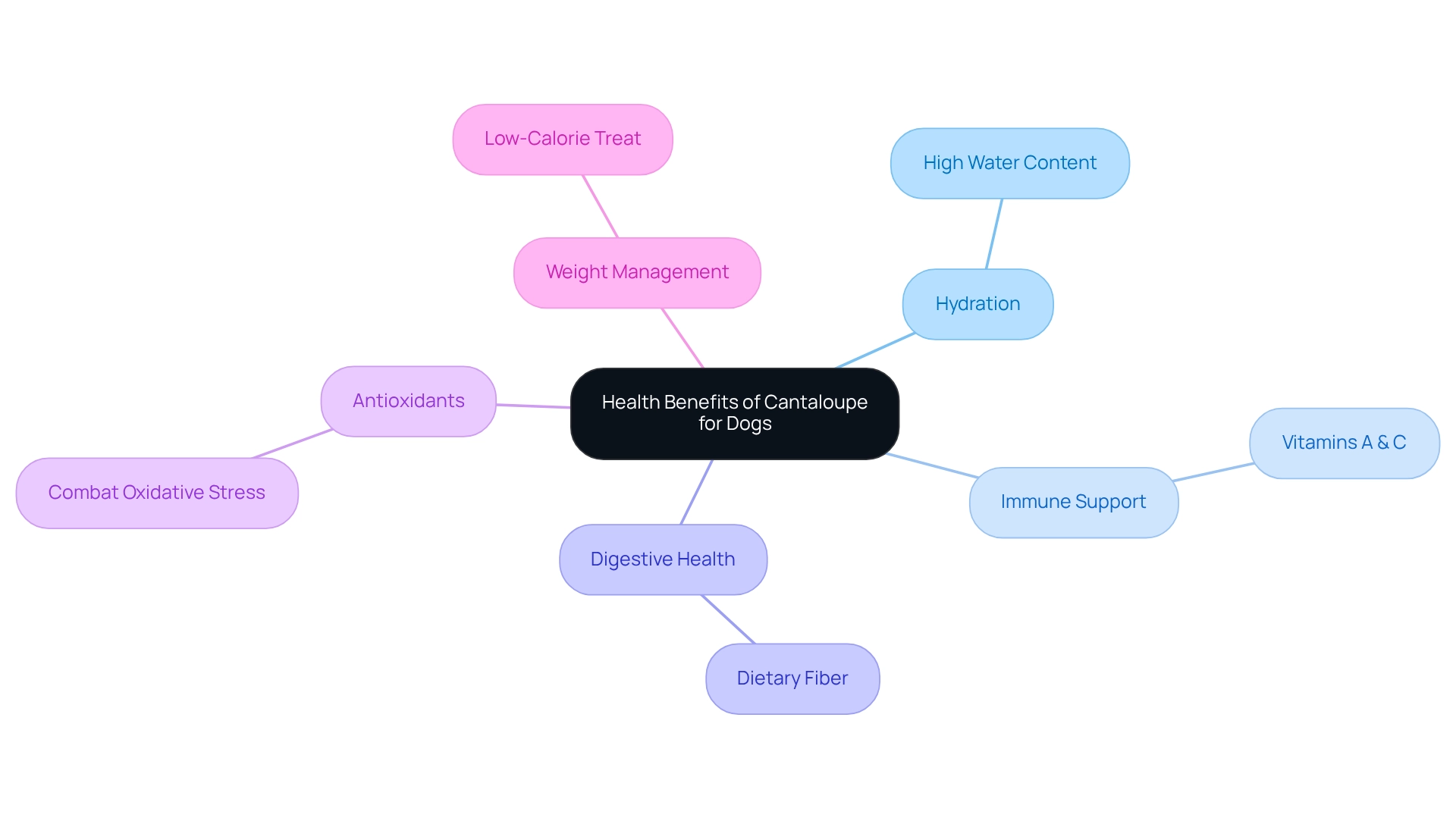Is Cantaloupe Good for Dogs? Health Benefits and Risks Explained
Overview
Cantaloupe can be a delightful treat for your furry family members, providing both hydration and essential nutrients like vitamins A and C. These vitamins are known to support immune function and aid digestion, making cantaloupe a beneficial addition to their diet when given in moderation.
However, it’s important to be aware that while cantaloupe offers these health benefits, it also carries some risks. If consumed excessively, it may lead to gastrointestinal upset. Therefore, practicing safe serving methods is crucial to prevent any choking hazards.
Remember, a little can go a long way in ensuring your pet enjoys this tasty fruit safely.
Introduction
As pet owners, you strive to provide your furry family members with nutritious and enjoyable treats. Cantaloupe emerges as a delightful option that not only offers hydration but also comes packed with health benefits. This juicy melon is rich in essential vitamins and dietary fiber, making it a wonderful addition to your dog’s diet, especially during those warm summer days.
However, it’s important to navigate the safe incorporation of this fruit into your pet’s meals. Understanding its nutritional value, potential risks, and proper serving methods is key. From promoting digestive health to ensuring adequate hydration, exploring the multifaceted benefits of cantaloupe reveals how this refreshing fruit can enhance your dog’s menu, all while keeping their safety at the forefront. Let’s embark on this journey together, ensuring our beloved pets enjoy the best in their diets.
Define Cantaloupe and Its Nutritional Value for Dogs
Cantaloupe, a delightful and hydrating melon made up of about 90% water, raises the question: is cantaloupe good for dogs, especially during warm weather? This fruit is rich in essential nutrients, including vitamins A, B6, and C, along with dietary fiber and potassium. Vitamin A is vital for maintaining healthy vision and skin, while vitamin C acts as a powerful antioxidant that supports the immune system. The dietary fiber in cantaloupe promotes digestion, contributing to a healthy gut and overall well-being.
When included in your dog’s diet in moderation, you might wonder, is cantaloupe good for dogs, as it can offer numerous health benefits. On hot days, the hydration it provides is especially advantageous, leading many to wonder, is cantaloupe good for dogs, as it helps to keep your pets cool and refreshed. Furthermore, the vitamins and minerals contribute to a balanced diet, enhancing your furry friend’s overall health, prompting the inquiry of is cantaloupe good for dogs. However, moderation is key when determining if cantaloupe is good for dogs, as excessive consumption can lead to gastrointestinal upset. According to the AKC, feeding more than the recommended amount can indeed cause discomfort, underscoring the importance of serving this fruit in appropriate portions.
As Anna Burke from the AKC notes, “Here at the AKC, we field many queries from anxious dog owners about what is and isn’t safe for their canine companions to eat.” This highlights the importance of understanding safe feeding practices. Innovative serving techniques, like hand-fed pieces, smoothies, or frozen treats, can transform cantaloupe into a delightful and nutritious snack for your pets. By thoughtfully introducing this fruit, you can enrich your pets’ diets while ensuring they receive the hydration and nutrients they need, aligning with the AKC’s commitment to promoting a healthy lifestyle through proper nutrition and exercise.
Explore the Health Benefits of Cantaloupe for Dogs
Many pet owners wonder, is cantaloupe good for dogs, as it offers wonderful health benefits for your furry family members. Its high water content, along with the question of whether is cantaloupe good for dogs, is a great way to keep dogs hydrated, especially during those warm days when they need it most. This delicious fruit, which is packed with vitamins A and C, raises the question: is cantaloupe good for dogs, as it supports immune function and promotes healthy skin? Plus, the dietary fiber aids digestion, helping to prevent constipation—something every pet owner worries about, leading to the inquiry of is cantaloupe good for dogs.
Considering the antioxidants in cantaloupe that can help combat oxidative stress, one might wonder, is cantaloupe good for dogs, as it may potentially reduce the risk of chronic diseases. By consistently providing small portions of this low-calorie treat, you can help your pets maintain a healthy weight, making it a perfect substitute for those who ask, ‘is cantaloupe good for dogs?’ They’ll love the taste, and you’ll feel good knowing you’re contributing to their overall well-being, which raises the question: is cantaloupe good for dogs? Remember, when considering if is cantaloupe good for dogs, a little can go a long way in nurturing a happy and healthy pet!

Identify Risks and Precautions When Feeding Cantaloupe to Dogs
Cantaloupe can be a delightful treat for your furry family members, but it’s essential to be aware of certain risks when determining if cantaloupe is good for dogs. This fruit contains natural sugars that, when consumed in excess, may lead to gastrointestinal issues such as diarrhea, vomiting, or bloating. As Shane Grosskopf wisely notes, “Tempting as it may be to share our favorite foods with our pets, it’s crucial to understand that not all human foods are safe for canines.” To ensure a nurturing environment for your pet, introduce melon gradually into their diet, observing for any adverse reactions.
It’s important to strictly avoid the rind and seeds, as they can pose choking hazards or lead to intestinal blockages. In fact, there have been instances where canines needed urgent veterinary care after consuming these sections of the produce. It is always advisable to consult with a veterinarian about the appropriate serving size, especially when considering if cantaloupe is good for dogs, to ensure your dog’s safety and well-being.
Innovative methods to serve this refreshing fruit include:
- Preparing melon smoothies
- Frozen bites
- Yogurt mixes
- Food toppers
- Dehydrated snacks
These options enable you to safely include cantaloupe in your pet’s diet while fostering a caring bond through shared experiences.
Learn How to Prepare and Serve Cantaloupe Safely to Dogs
When it comes to safely preparing melon for your furry family members, start by selecting a ripe, fresh fruit. It’s important to thoroughly wash the exterior to remove any pesticides or contaminants, ensuring a safe treat for your dog. Slice the melon in half and gently remove the seeds and rind, as these parts can pose significant dangers, including potential blockages or digestive issues. Serve the soft, fleshy part in small, bite-sized pieces to minimize choking hazards.
Consider that cantaloupe is good for dogs as it can be a delightful occasional reward, but remember it should not make up a large portion of your dog’s diet—ideally, it should not exceed 10% of their daily caloric intake. A few small pieces of melon once or twice a week is just right for your pet. For a chewy summer treat, consider freezing thin slices of melon. Always monitor your dog for any adverse reactions when introducing new foods, as their health and safety are paramount.
If your dog is overweight, be cautious with sugary fruits, as they can contribute to obesity and other health concerns. Moderation is key! Additionally, any leftover cantaloupe can be stored in an airtight container in the fridge for up to 5 days, helping to minimize waste while continuing to care for your pet’s needs.
Conclusion
Cantaloupe shines as a nutritious and hydrating treat that can truly enhance your dog’s diet, especially during those warm summer days. Packed with high water content and essential vitamins like A and C, along with dietary fiber, this delightful fruit offers a plethora of health benefits. It supports immune function, promotes digestive health, and serves as a low-calorie treat option. When served appropriately, cantaloupe can be a wonderful addition to your furry family member’s menu.
However, it’s important to approach the incorporation of cantaloupe with care. Understanding the risks of overconsumption, such as gastrointestinal issues, and ensuring proper preparation by removing seeds and rind are vital steps for pet owners. Remember, moderation is key; introducing cantaloupe gradually and keeping an eye out for any adverse reactions will help maintain your dog’s health and safety.
By following safe serving practices and being mindful of portion sizes, you can confidently offer cantaloupe as a refreshing snack. This not only boosts the overall well-being of your beloved pets but also reinforces the importance of a balanced diet. Ultimately, cantaloupe can be a delightful treat that brings joy and health benefits to dogs, nurturing a happy and vibrant life for our cherished companions.
Frequently Asked Questions
Is cantaloupe good for dogs?
Yes, cantaloupe can be good for dogs when included in their diet in moderation. It offers numerous health benefits, including hydration and essential nutrients.
What nutrients does cantaloupe provide for dogs?
Cantaloupe is rich in vitamins A, B6, and C, as well as dietary fiber and potassium. Vitamin A supports healthy vision and skin, while vitamin C acts as an antioxidant that boosts the immune system.
How does cantaloupe benefit dogs during warm weather?
Cantaloupe is about 90% water, making it a hydrating fruit that can help keep dogs cool and refreshed on hot days.
Can too much cantaloupe be harmful to dogs?
Yes, excessive consumption of cantaloupe can lead to gastrointestinal upset in dogs. It is important to serve this fruit in appropriate portions to avoid discomfort.
What are some safe ways to serve cantaloupe to dogs?
Safe serving techniques include offering hand-fed pieces, blending it into smoothies, or freezing it into treats. These methods can make cantaloupe a delightful and nutritious snack for pets.
Why is it important to understand safe feeding practices for dogs?
Understanding safe feeding practices helps dog owners ensure that they are providing appropriate and healthy foods for their pets, avoiding potential health issues related to improper feeding.







